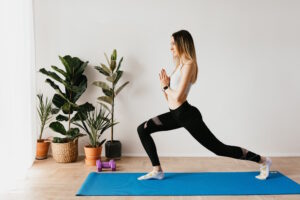
In the relentless rhythm of modern life, stress can accumulate, affecting both our physical well-being and mental equilibrium. Amid the chaos, the practice of Pilates emerges as a beacon of solace – a method that not only enhances physical strength but also offers a pathway to stress relief and relaxation. By customizing a Pilates routine tailored specifically to alleviate stress, you can embark on a transformative journey that nurtures both body and mind.
How can Pilates reduce stress?
Pilates acts as a powerful stress-reduction tool through its combination of mindful movement, controlled breathing, and focus on the mind-body connection. The deliberate and precise nature of Pilates exercises engages the mind, directing attention away from stressors and into the present moment. This redirection of focus creates a mental respite, allowing you to temporarily escape the noise of daily life.
Additionally, the synchronization of breath with movement in Pilates activates the parasympathetic nervous system – the body’s natural relaxation response. This physiological shift counters the stress-induced fight-or-flight response, promoting a sense of calm and tranquility. Through these mechanisms, Pilates provides not only physical benefits but also serves as a vehicle for emotional and mental well-being.
How do you modify Pilates exercises?
Modifying Pilates exercises is key to creating a routine that suits your individual needs and capabilities. If you’re new to Pilates or dealing with physical limitations, consider the following modifications:
1. Reduced Range of Motion: Limit the range of motion in exercises to ensure comfort and safety. For instance, if a full roll-up is challenging, modify by only rolling halfway.
2. Props: Utilize props like yoga blocks or resistance bands to provide support or increase or decrease intensity.
3. Supportive Surfaces: Perform exercises on a mat, cushion, or soft surface to reduce impact on joints.
4. Chair Modifications: Incorporate a sturdy chair to aid in balance and stability, especially for exercises that involve standing or balancing.
5. Breathing Emphasis: Focus on deep breathing to engage the relaxation response, even if certain movements are challenging.
How do you structure a Pilates class?
Structuring a Pilates class for stress relief involves careful consideration of exercise selection, flow, and progression. Begin with a gentle warm-up that includes diaphragmatic breathing to set a calming tone. Progress into a sequence of exercises that target the core, elongate muscles, and promote flexibility. Integrate mindfulness cues, encouraging participants to be fully present in each movement.
Incorporate exercises that involve rolling, stretching, and controlled movements to release tension in the spine and muscles. Include exercises that engage the breath, such as lateral thoracic breathing, to enhance the relaxation response. Towards the end of the class, introduce soothing stretches and a closing relaxation exercise.
Does Pilates help with stress and anxiety?
Absolutely, Pilates can be a valuable ally in managing stress and anxiety. The intentional nature of Pilates movements, combined with mindful breathing, promotes relaxation and redirects focus away from stressors. The mind-body connection fostered in Pilates enhances body awareness, enabling you to recognize and release physical tension associated with stress.
Furthermore, the mindfulness cultivated in Pilates translates beyond the mat, providing you with tools to manage stress in daily life. By creating a routine that combines targeted exercises with breath control and mindfulness, you create a space for respite and self-care, contributing to your overall mental well-being.
Summarizing the Answers
Customizing a Pilates routine for stress relief involves a thoughtful approach to exercise selection, modifications, and sequencing. By leveraging the mindful movements, controlled breathing, and mind-body connection inherent in Pilates, you craft a unique journey to tranquility. This personalized approach not only enhances physical well-being but also provides a haven for emotional and mental respite. Through a tailored Pilates routine, you set forth on a path that nurtures your body and mind, offering relief from the strains of modern life.